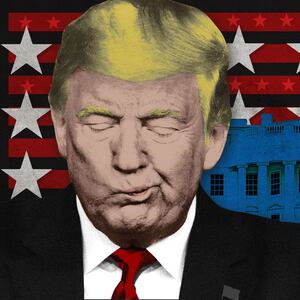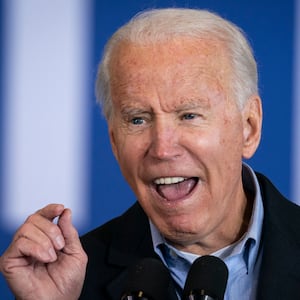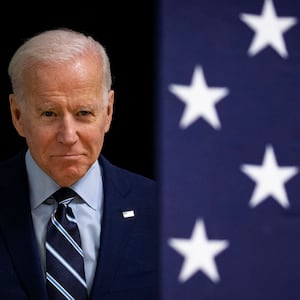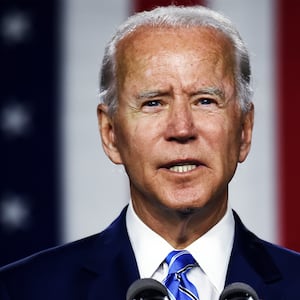Joe Biden was declared the 46th president of the United States on Saturday morning, winning the bitter campaign he has described as “a battle for the soul of the nation” after four tense days of counting—and making incumbent Donald Trump a one-term president.
The election of Biden, a former two-term vice president and an icon of the Senate for nearly four decades, is a restoration of Democratic power in the White House after four years in the political wilderness. By defeating the president, Biden has realized the hopes of supporters who believed he was the best candidate to win back the disenchanted white suburban and working-class voters who had sent Trump to the White House four years ago, and to build a winning coalition that embraced the Democratic Party’s racial and generational diversity.
But with control of the U.S. Senate on the verge of slipping from the party’s grasp, and with hopes of an electoral landslide having evaporated early on Election Night, Biden’s victory is far from the stunning national repudiation of Trumpism—and of the bigotry, cruelty, cronyism, and incompetence that came to define it—that many Democrats had hoped for.
“I am honored and humbled by the trust the American people have placed in me and in Vice President-elect Harris,” Biden said in a statement released to reporters after the race was called. “In the face of unprecedented obstacles, a record number of Americans voted, proving once again, that democracy beats deep in the heart of America.”
“With the campaign over, it’s time to put the anger and the harsh rhetoric behind us and come together as a nation,” Biden continued. “It’s time for America to unite, and to heal. We are the United States of America, and there’s nothing we can’t do, if we do it together.”
According to a Biden campaign official, Biden was at home with his family when he learned the news. “It’s finally daytime,” the official added.
At the time the race was called, Trump was doing what he spent so much of his presidency doing: golfing at his eponymous club in northern Virginia.
Biden won the Electoral College by at least 290 electoral votes over Trump’s current tally of 214, as of press time, with a national popular vote victory of at least 4.3 million votes. As election watchers had predicted for months, Pennsylvania—Biden’s onetime home state—was the tipping point for his campaign’s election victory, where Biden’s vote margin tipped over 30,000 votes, officially adding its 20 electoral votes to his tally at 11:30 a.m. ET on Saturday. Within the hour, Nevada’s six electoral votes were added to that tally.
While the Biden campaign had bragged in the closing days of the campaign that he had numerous routes to the White House, the former VP’s road to electoral victory largely followed the most obvious path: winning back the so-called “Blue Wall” states of Michigan and Wisconsin in the Upper Midwest, as well as reclaiming Arizona, a newly purple state that had only backed one other Democratic presidential candidate since the 1940s.
In a statement released moments after Biden was declared the victor, Trump accused the newly minted president-elect of “rushing to falsely pose as the winner,” and attacked news organizations for legitimizing the election.
“This election is far from over,” Trump said, vowing that next week, “our campaign will start prosecuting our case in court to ensure election laws are fully upheld and the rightful winner is seated.”
The winner of an election irrevocably shaped by the coronavirus pandemic, which has claimed more than 230,000 American lives, Biden has sought to temper expectations that a Democratic revival in Washington would immediately undo Trump’s mishandling of the crisis or slow the rising rates of infection that Biden has warned indicate a “dark winter” ahead. Instead, Biden’s COVID-19 roadmap emphasizes experience, competence, and unified action across levels of government to fight the American outbreak.
But with hopes of Democrats regaining the Senate largely in tatters, other aspects of the former vice president’s platform—creating a public health care option, raising the federal minimum wage, repealing portions of the Trump tax cuts—will now rely on the cooperation of Republicans unchastened by the election’s results, and invigorated by Trump’s improbably resilient brand of American populism.
The election of a 77-year-old Democratic Party icon with nearly half a century of public service to his name was far from certain at the year’s outset. Biden initially struggled to gain a foothold against the largest and most diverse field of presidential contenders in American history, finishing low in the first two nominating contests and operating on a shoestring budget as even longtime backers supported his rivals. Only Biden’s blowout victory in South Carolina, buoyed by enormous support from Black voters who backed President Barack Obama’s vice president in record numbers, saved him from ending his third run for the White House in defeat.
As the field narrowed to just two candidates—Biden and Sen. Bernie Sanders (I-VT), whose platform of Democratic socialism invigorated a new generation of progressive voters—Biden’s campaign struggled at times to fully coalesce a party divided between traditional priorities and arguments from Sanders’ base, who pointed to Trump’s election as proof that mainstream political institutions had failed.
But Trump’s mismanagement of the once-in-a-century pandemic threw the stakes of the election into stark relief even for some of the most reticent Biden voters. The former vice president made outreach to Sanders’ fans a top priority once his nomination was secured, and a much-feared repetition of 2016, when disaffected Republicans and Democrats alike broke for third-party candidates in protest, never materialized.
Trump, faced with the nearly impossible task of repeating his first insurgent campaign while holding the nation’s highest office, spent months attempting to paint Biden as too old, too addled, and too “sleepy” to become the commander-in-chief. The president’s campaign claimed, without any basis, that Biden was in a state of obvious cognitive decline, a strategy that backfired when Biden exceeded the low expectations set for him by his opposition in two presidential debates.
Increasingly desperate attempts by Trump, who was impeached by the House of Representatives for both abuse of power and obstruction of Congress, to smear Biden and his family as corrupt in the final days of the campaign also failed to find a receptive audience beyond the president’s increasingly concentrated base.
Beyond Trump’s fruitless attempt to redefine the public image of a politician who had been in the spotlight since the 1970s lay Biden’s more fundamental appeal: that after four exhausting years marked by the loss of millions of jobs, racial unrest, near-constant scandal, and a deterioration of political discourse, Americans might once again feel optimistic about the country’s direction.
Biden’s general election plans were defined by the seriousness of coronavirus. Familiar with handling public health scares in the past, Biden halted parts of his campaign after winning the Michigan primary and becoming the presumptive nominee.
Mindful of the possibility that the virus could spread to the public (and to the septuagenarian candidate himself), top aides prohibited organizers from campaigning across states. They stopped fundraising in person and went all-digital from his home in Delaware. The virtual appearances, often spotty in attendance, were meant to show a safer approach than what Trump was doing.
His surrogates started to rally for him behind-the-screens. “I’ve talked to my other combatants, other people who ran,” Sen. Cory Booker (D-NJ) told The Daily Beast last week, describing details from conversations with other former candidates about Biden.
“During the campaign, our affection for him grew deeper because he was consistently, and even at times remarkably, kind and extended grace to us,” he said.
“He really was the statesman of our group.”
While Biden generally stayed at home at the onset of the pandemic through the summer months—setting a top example for others to follow, his campaign often said—operatives at the party level quietly reworked their goal to have the Democratic National Convention in Wisconsin in July. After much insistence that a normal gathering was still in the works, officials concluded that it was not safe. The event would be announced as a digital endeavor to much skepticism and internal bickering. When Biden offered arguably the best oration of his political career, he put the business of the formal nomination behind him.
“It was in our darkest moments that we made the greatest progress,” Biden said. “There’s never been anything we haven’t been able to accomplish when we’ve done it together,” he went on. “This is our moment to make hope and history rhyme.”
When Biden’s title changed from former vice president to Democratic nominee, Republicans’ attacks on him also changed, more so in magnitude than in substance. By the time the third debate came around, Trump had reached a point of obsession with an entirely different Biden: his son Hunter, which the president felt had to be pronounced on the televised stage.
The storyline that Trump and Republican allies on Capitol Hill tried to use to crush Biden in the primary—linking him and his son to various assertions of foreign wrongdoing—were reused in the general election. Just as outside strategists had nearly closed up shop on pitching opposition research to credible outlets, a story that Team Trump had hoped would constitute a gotcha surprise surfaced in the New York Post in mid-October, pushed by Trump’s lawyer Rudy Giuliani, claiming this time that Hunter Biden had engaged in even more misconduct. It resonated with right-wing news producers and social media corners, but few other forums. Biden briefly defended his family’s name. His aides mostly ignored the whole thing.
“I have not taken a penny from any foreign source ever in my life,” Biden said during the Nashville debate. “The guy who got in trouble in Ukraine was this guy trying to bribe the Ukrainian government to say something negative about me, which they would not do and did not do because it never, ever, ever happened.”
In that instance, Biden was done. The story had not moved the needle. Voters did not care.
Over three decades after Biden first became a presidential hopeful, he has now peaked in politics, only to find an even greater challenge ahead. The “dark winter” he recently spoke of is expected to arrive soon. Individuals are longing for a renewed sense of well-being. They want their economy to thrive. And, as Biden said in Warm Springs, Georgia, people simply need to “heal.”
The transition period between the Trump administration and a Biden administration is likely to present much uncertainty and possible unrest. With a Democratic-controlled House and the fate of the Senate in the hands of Georgia voters, newly weakened Republicans in Washington are already pledging to push back against Biden’s platform. His campaign has strategized around the possible civil and legal strife.
“It’s all about contrasts in this election,” a Biden adviser echoed leading up to this moment.
Biden’s biography, marked in equal parts by opportunity and tragedy, mirrors that of the beleaguered nation he is now set to lead. Biden moved when he was young from Scranton, Pennsylvania, to Claymont, Delaware, an uprooting that came to define the latter half of his campaign’s closing economic message. Up against the opulent image of billionaire Trump, he fine-tuned his themes to include a “Park Avenue” line, seeking to bash the president’s privileged life.
“Joey, a job is about a lot more than a paycheck. It’s about your dignity,” Biden often recited during his stump speech, quoting his father. “It’s about respect. It’s about your place in your community. It’s about being able to look your kids in the eye and say, honey, it’s going to be okay.”
Biden ended up among the student body’s lower ranks at his colleges, graduating near the bottom of his class at the University of Delaware and the Syracuse University College of Law. Perhaps more than any academic accomplishment at Syracuse, Neilia Hunter became his focus—so much so that the two got married and moved to Wilmington within months of his graduation. In the same city where he would win election to the city council amid still-ongoing civil unrest, Biden became a public defender during times of deep racial division.
But it was his run for the Senate, where he brazenly rivaled a Republican with plenty of money and popular sway, that molded his early career. Biden mounted a long-shot bid, running a campaign staffed largely by friends and family, including his sister and longtime confidant Valerie Biden Owens. When he cleared that bar, it was instant history: 29-year-old Biden was elected the sixth-youngest senator in American history.
Weeks later, Biden suffered the first of many personal losses that would later come to define his public image. One week before Christmas, and less than a month before Biden was to be sworn into office, Neilia and their one-year-old daughter Naomi were killed in an automobile crash. Biden’s sons, Beau and Hunter, were both injured, and while Biden mourned, he contemplated resigning from his seat. Eventually, he was sworn in at age 30, standing over his sons’ hospital bed.
Life in Washington provided Biden a chance to shine as an affable bridge between opposing political parties. While Republicans often liked his eagerness to build consensus, Democrats at times did not, and sometimes the sides were flipped. He earned respect from both. When he took over the top role in the Senate’s influential Judiciary Committee, Biden shaped the Supreme Court’s hearings first for Judge Robert Bork, and later, Justice Clarence Thomas. He recalled the Bork battle in his memoir “Promises to Keep,” just after he ended his presidential run in the fall of 1987.
“For the first time in my career in the Senate I wasn’t sure I could perform with the grace the day required,” Biden wrote. “This was no time for self-pity, I kept telling myself, no time for rancor... Things happen. Still, it didn’t make it easier for me. I had never quit anything in my life. I’d stayed in and got beat, but I’d never backed down from a fight in my life. I’d never quit. But I had to do it right.”
Biden’s second presidential run positioned him serendipitously against then-candidate Sen. Barack Obama of Illinois in 2008. After he was plucked out of calmer days to be Obama’s loyal running mate, he enjoyed a portfolio that spanned from foreign affairs to women’s rights, and helped get enough Hill support to pass the Affordable Care Act.
Biden had considered a third run for the presidency at the end of Obama’s second term, but decided against it after the death of Beau, a state attorney general and the family’s torchbearer, from brain cancer in 2015. But Biden cut his political retirement short after an outbreak of white supremacist violence in Charlottesville, Virginia, in 2017.
“Today we have an American president who has publicly proclaimed a moral equivalency between neo-Nazis and Klansmen and those who would oppose their venom and hate,” Biden wrote after the Virginia violence in 2017. “If it wasn’t clear before, it’s clear now—we are living through a battle for the soul of this nation.”
For Biden and his campaign, repeating the same positive affirmations—soul, unity, and truth—was a point of pride. And delivering it in dimmer moments took discipline.
“They were consistent on message,” said Guy Cecil, the president of Priorities USA. “Look at Biden’s closing ad on camera. It’s literally some of the same exact sentences as his first speech,” he said.
“It is very difficult when you are losing a race, or you feel like you are losing a race, to be that consistent. And not to change tracks. It’s also very difficult to do that when you’re running against Donald Trump because the human impulse is to chase down every tweet, every insane thing he says, all of the craziness,” Cecil said. “I think Biden has done a really good job of shutting out some of that other noise and trying to stay as focused as possible.”
Additional reporting: Hanna Trudo











